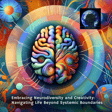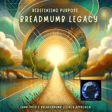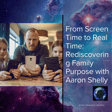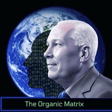Podcast Introduction
00:00:01
Speaker
Welcome to The Organic Matrix, the life guide in your pocket. Have you ever felt engulfed in a wave of emotion that doesn't even belong to you? Ever wish that you can navigate these overwhelming feelings with a greater sense of control and ease? If this resonates with you, we have a special treat for you. We're inviting you back to a deeper exploration of our previous conversation in today's episode of The Organic Matrix.
Guest Introduction: Jennifer Moore
00:00:25
Speaker
Remember Jennifer Moore? She's back with us again to continue our journey into managing an empathic overwhelm and establishing firm boundaries. Jennifer is a renowned expert known for her invaluable guidance to intuitives, lightworkers, and creatives. Together we'll strive to answer the pressing question, how can we transform the challenges of being an empath into a superpower that fuels our personal and spiritual growth?
00:00:53
Speaker
so buckle up for a deeper dive into this important topic. Keep this episode handy for those moments when you need support in managing empathic overwhelm. It's time for you to reclaim your power, navigate the emotional storms with confidence, and truly thrive in your journey as an empath. Are you ready? Let's delve in.
00:01:14
Speaker
Looking for career advice, personal development tips, or inspiring stories? Our Matrix Mentors has you covered. Don't miss out! Bookmark our podcast and follow us on social media for a life guide in your pocket.
00:01:26
Speaker
Jennifer, welcome back to the show. Samantha, thank you so much for having me here and for welcoming me back. We had such a good conversation last time. I can't wait to get started and talk again. Me too. I'm super thrilled to jump right into
Understanding Empathic Overwhelm
00:01:44
Speaker
it. How would you define empathic, overwhelm, and what are some common signs that someone may be experiencing it?
00:01:51
Speaker
So one of the common signs that we may be experiencing it is that if you look at your own life and you're sort of, what you're feeling ah is not reflect reflected in your reality. That you're feeling, over a lot of times somebody might be feeling intense anxiousness intense sadness intense just overwhelm self-doubt any number of things and yet everything on paper looks good like you've got a roof over your head you've got money in the bank account your relationship is fine
00:02:32
Speaker
Everybody in your family and in your world is doing pretty okay. You're doing pretty okay. And yet you are just have these feelings of overwhelm and distress that you cannot shake. And so the thing is that highly sensitive. So I see you know empathy or and being an empath as being on a spectrum.
00:02:57
Speaker
And there are people who have a capacity for empathy and can be empathetic, but they're not necessarily, they can see or sense what's going on with somebody, but they're not absorbing it. Whereas empaths are people who take on the thoughts, the feelings, the energy and the sensations that are coming from the world around them But unlike sort of your less extreme empath person, they process the information as if it's their own. And so they will walk into a room where maybe something has been happening before. And whereas if somebody somebody who's maybe not as porous
00:03:44
Speaker
might go in and be like, wow, I really sense a lot of sadness in this room. The empath walks into the room and goes, why do I suddenly feel so sad? Why do I suddenly feel so upset? Why am I having such a hard time here? And the thing is that for many of us, and we kind of talked about, I think we talked a bit about just sort of the invalidation that can happen when we're children,
00:04:06
Speaker
ah You're too sensitive. You're overreacting. You're taking it too personally. The thing is that a lot of times we did not experience validation for what we were picking up. It was like, so we would often be like, what is wrong with me? Why am I feeling this way? It doesn't make any sense. And so what I found is that empathic overwhelm and that feeling of just like feeling they're just distressed and flooded very often comes with feelings of confusion, with feelings of doubt, with feelings of like, what is wrong with me? Why am I feeling this way? This doesn't compute. this doesn't There's just nothing in my life that matches this. And so that is the thing that I have found over and over again is a pretty good indication that somebody is experiencing empathic overwhelm is when there is no correlation between
00:05:06
Speaker
reality and what you're feeling on the inside. I will say though, that if somebody has a history of a of trauma, and especially if it's unresolved trauma, that sometimes if you've got a lot of skeletons in the closet and a lot of stuff that's sort of like never been addressed,
Impact of Trauma on Empaths
00:05:30
Speaker
That can get activated and even when everything in the world and life seems fine Something you know Maybe you're watching a TV show and you saw something that just activated something and all of a sudden you're sort of being brought back to old memories This is where if you know you've done the work if you know if you kind of know what's under the hood and you know What makes you tick?
00:05:58
Speaker
This is sort of where then it's much more likely that it's empathic overwhelm. So how was that for an answer? Hopefully that was helpful. That
Social Anxiety and Self-Doubt in Empaths
00:06:08
Speaker
makes sense to me. And when I reflect on that, I think about times where like social anxiety, like when I'm over thinking the energy in the room, like sometimes I'll have a tendency of walking into the room and feeling like I'm being judged by somebody else. Yes, yes, yes.
00:06:26
Speaker
So I had this realization a couple many a number of years ago. I was going to was doing a lot of like sort of transformational entrepreneur kind of business retreats. And I noticed like the first day I was at one of these events, I would be like, this is really fun. I'd be enjoying myself. I'd be connecting with people that I knew and I loved and just like having a blast. And by the second day, I'd start feeling kind of weird. I'd start feeling like that sense of like Fear of people judging me I'd start feeling this sense of like I'm just like like I don't have my I don't have my ish together I don't know what I'm doing and I would start experiencing a lot of self-doubt a lot of self a lot of self-judgment a lot of just a lot of feeling uneasy and uncomfortable and what I realized was that I
00:07:18
Speaker
This was a place where there were a lot of people who were coming for information, but they were also discovering how many gaps there were between how they were running their business and how they should be running their business. And essentially within and sort of the transformational
00:07:41
Speaker
business coaching world There's kind of a formula of you kind of introduce people kind of the top is you sort of introduce
Transformational Coaching Stages
00:07:50
Speaker
people to? Information and you get them kind of you get them invested in it The middle is where you start to push the breeze push on the pain and push on the bruises and help people to recognize like where their gaps are and where their Deficits are and this is where people tend to be very very very uncomfortable and then the next part of the formula is essentially that they are then presented with here's a solution i just happen to be the person who has a solution but here's the solution and and you know and if you sign up for my x thousand dollar program then you know we'll fix this for you
00:08:30
Speaker
So I just share that not because it's necessarily relevant to be in an empath, but I do think it's really useful information for anybody who's kind of checking out the transformational healing coaching world just to understand the formula. But anyway, so that middle point where everybody's starting to feel like, wow, I don't know what I'm doing, I would start feeling self-doubt, overwhelm, questioning myself. Hitting that midpoint where everybody is sort of looking at themselves, looking at their stuff and realizing that there are, that and discovering their gaps, discovering their deficits, discovering what needs to be fixed, and all of a sudden I start feeling uneasy, I start feeling a social anxiety, I start feeling
00:09:21
Speaker
I start feeling self judgment. I start questioning myself. I start really like all these things that I thought, I thought I worked on that. I thought I got over that. I thought I'd worked through all of that stuff.
00:09:35
Speaker
all of a sudden I'm in it. And what dawned on me after going through this more than one time was that... there is truly an all in one platform for podcasterss if you're interested in starting a podcast or you already have one this is a great message for you I had to pay separate subscriptions for transcripts, video editing, and content distribution, but Zencaster combines all of these features, saving me so much time on editing and producing. Now I can focus more on what I love the most, interviewing my amazing guests. With Zencaster's 4K video streaming and advanced AI tools, you don't need fancy equipment to get high quality recordings.
00:10:18
Speaker
Plus, it's super convenient to get captions, short clips, and transcripts all in one place, eliminating the hassle of uploading and downloading between editing multiple times. What I love the most is how Zencaster helps me monetize my podcast as well, through their partner program, connecting with ads and brands for collaboration.
00:10:40
Speaker
If you're a podcaster looking to streamline your workflow and monetize your passion, I highly recommend Zencaster. Check it out today. Send us a DM or check out the description below for the link.
00:10:55
Speaker
my experience was actually a reflection of what a lot of other people were feeling. And when I realized that some of it was certainly my old stuff, but I would say the majority of it was the amplification and the picking up on all of the tension, all of the discomfort, all of the distress, all of the anxiety that was going on there.
00:11:23
Speaker
So I think the thing is that for so many of us as highly sensitive empathic people and sort of the more empathic and the more sort of into that empath spectrum you go, the more susceptible you are to picking up on especially the things that people are not acknowledging for themselves. And when it comes to being in a social gathering where everybody wants to look like they've got it together, you've got a lot of people who are sort of presenting like they know that what's happening.
Empaths in Social Settings
00:11:57
Speaker
but But underneath the surface, there are all these insecurities, there are all of these doubts, there's all of these other emotions. And as empaths, we walk into those kinds of spaces and we are picking up all the things that are sort of like the storms that are kind of brewing under the surface that people don't want to own.
00:12:21
Speaker
I think that in general, while it may be uncomfortable to see witness raw real pain for an empath because especially like and as a young empath, we can have this experience of being like we just see it and we feel it.
00:12:38
Speaker
But I do think that in many ways, it's much easier for an empath to be in a place where people are owning their feelings than being in places where people are pretending to be experiencing one thing and actually underneath the surface going through something completely different.
00:12:57
Speaker
And so I would actually venture to say that in addition to just like some of the classic fear of persecution, some people have coined the term witch wound now for that idea of when maybe an ancestor, or if you believe in reincarnation in a past life, you were burned at the stake, that there can be some deep fear of being your authentic self in any kind of space where you have more than a few people gathered. that i think So there are some legitimate reasons why we ourselves might have some social anxiety and come into things, but I also think that very often it is really amplified
Managing Empathic Overwhelm
00:13:41
Speaker
by empathic sensitivity and that we're not only feeling our own social awkwardness and our own sort of adolescent or and like misfit toy childhood experiences, but we're also really picking up on what's going on in that collective as well. I resonate with that deeply.
00:14:05
Speaker
What are some practical techniques or strategies individuals can use to manage and release these overwhelming emotions as an empath? So that, I mean, that's the million dollar question, isn't it? And so the way that I've, so first off, what I want to say is a couple of things. One, we didn't get this way overnight. And so it's not like you're just going to like, you know, take a pill and everything is going to be better. As my dear friend Britt Bullnick often says, it's a process, not a pill. I think it was Britt who originally said that.
00:14:37
Speaker
um and you know And so the thing is that when it comes to processing what's going on, bottom line, the very, so i Empathic Mastery, which is my book, which is a five-step system to go from emotional hotness to thriving success, starts with the first step of Empathic Mastery is recognize. And first, when I first started understanding the idea of recognize, I just sort of thought it was like recognizing what's mine, what's not mine.
00:15:05
Speaker
But the longer that I have been around this, the more I've come to understand that there are layers, many, many layers to the idea of recognize. And so we first, before we can even really start to address it, we have to identify ourselves as highly sensitive, empathic people. We have to recognize that we are this because if we've been invalidated, if we've had the experience from early childhood that basically we were too sensitive, that we were overreacting, that we were making a big deal out of nothing.
00:15:43
Speaker
What happens is a lot of times that causes us to try to suppress our sensitivity, to downplay our sensitivity, but also to question our truth, to really be like, well, I must be completely wrong. I must not be picking this up. So the first step
Recognizing Personal Triggers
00:16:02
Speaker
of recognize is just recognizing that we are picking things up. That is legitimate and that who we are and what we are is like is real. And so once we understand that we are an empath or a highly sensitive empathic person,
00:16:22
Speaker
But what then happens from that is then we can start living from a place of, okay, if this is true, then this, this, this, and this. And so the next step is recognizing when we're out of sorts, when we're off balance, when we are feeling off kilter and being like, oh, I'm feeling out of sorts.
00:16:47
Speaker
and then recognizing or asking ourselves the question, is this actually mine or am I picking things up? And so what I love to do is put, and this is a simple exercise, I love to put my hands over my heart. And once I know I'm feeling something, I will ask myself the question, is this mine?
00:17:10
Speaker
Now, I would say that 9.9 times out of 10, the answer is yes and or both and. What I will get is some of this is yours, some of this is coming from outside of you. And so once I get that answer of some of this is yours and some of this is coming out from outside of you, I will ask a second question, which is what's mine, what's not mine?
00:17:40
Speaker
and understanding what's mine means that okay so for some reason this. I'll just give a complete random example for some reason being at the social gathering is bringing up my experience of the birthday party that i attended when i was six and a half years old and.
00:18:04
Speaker
and everybody like all of the little girl and and this little girl played a trick or like like this little girl ganged up, you know, got the other girls to gang up against me and played a trick on me. This did not happen, you guys. Just saying, I'm really making something up here.
00:18:20
Speaker
and And so then all of a sudden I'm at this other event and not only am I picking up on the social anxiety that these other people are feeling about themselves, I'm also feeling anxious because, oh my god, I have this aunt's inner child who's terrified that somehow the mean girls are going to gang up against me again.
00:18:40
Speaker
So once I have that understanding of like, okay, so this is about the memory of mean girls at six and a half, and this is about other people's feelings, then it's my job to deal with the part of me that is unresolved about the mean girls at six and a half. But it's also my job to let go of and release, which is the second step of empathic mastery, release,
00:19:04
Speaker
um the stuff that is not mine. And so what I really love to do is the simplest way to work with the release is to just put my hands over my heart and using my breath I will take in a nice deep breath and just sort of hold my breath and then as I exhale and I release I'll take my hands off my heart and I'll just express I'll take my hands and just kind of and offer them out and say as I exhale I release I release that which does not serve me, or I release this back to where it belongs. I send this back to where it belongs.
Breathing Exercises for Emotional Release
00:19:44
Speaker
And so just inhaling, and then I send this exhaling, I send this back to where it belongs. And this is a surprisingly simple, but also surprisingly effective technique. It gets more effective the more you do it too.
00:20:01
Speaker
So the first time you do it, you might be like, Yeah, Jennifer, that really worked for me. Not. But the more you do it, the more like, it's almost like you're training yourself to release this in the same way that if you've ever used like anchoring words, like learning how to use like, say, if you just say the word breathe, or you just say the word relax, you can kind of condition your body to be able to do these things, being able to say, I send this back to where it belongs or I release this back to where it belongs becomes this thing where you start to learn what you're doing. And I love incorporating the breath. So those two pieces of recognize and release really are the very beginning steps of this.
Importance of Boundaries and Spiritual Alignment
00:20:49
Speaker
And then in case you're curious, the three additional steps are protect, which has a lot to do with boundaries, which you and I were going to talk about, as well as energetic filters and shields setting up more protective, like developing a more robust strong aura of light all around us and Then the um and then the next step is connect because the universe of course a vacuum and so if we do not want to keep on attracting and drawing in Sort of more toxic negative energy. We need to be connecting with a power greater than ourselves and with the force of of light, a force of love, a force of wonder and health. And when we are really in alignment with that divine source, or however you define it, then we are much less vulnerable and susceptible to continuing to take on
00:21:45
Speaker
all of that intensity. And then the final step of empathic mastery is act, because words without works is dead. And we need to live in a way that reinforces our empathic safety by not doing things that are going to get us into trouble. and you know And one of those, an example of that is many empaths are very prone to rush into rescue. And one of the reasons why we are so prone to rushing into rescue is because we feel better when other people feel better. If somebody is feeling lousy,
00:22:25
Speaker
then it is extremely likely that we're going to feel that we're going to feel lousy because they feel lousy. And so it's also very, it follows that we feel better when they feel better. And so a lot of times what happens is when we are not able to sit with our own discomfort and sit with our own feelings and just be present with our humanity.
00:22:50
Speaker
then we have a really hard time sitting with and being present with other people's humanity, with other people's intense feelings. And so we tend to want to just jump in and fix. The problem with this is that, one, often we'll do it when it is unsolicited, and two, we will also do it at the expense of somebody's lessons, at the expense of somebody finding their own way. And so a really big part of ACT is learning how to allow people to live and do what they need to do without, for lack of a better word, meddling.
00:23:37
Speaker
Oh, that's the biggest thing. Everybody who walks into the spiritual world, that's the biggest thing that we learn being spiritual practitioners, that we cannot interfere in what people achieve. Even if it seems to be negative, like we all earn what we get after all. So it's like we all need to digest that karma, learn that lesson. Because if we do step in and try to fix the problem, the person that we care about is stuck in the loop.
00:24:06
Speaker
Well, and we will and be you know, there's a song a a reggae song That you know that I think of sometime that I think oh God it was so long I might have been I'm not gonna tell you who sang it because I'm gonna screw it up but it was called the song was called the harder they come the harder they fall and the thing is and you've probably heard the higher they climb the higher they fall or the lower they fall and the thing is that when we intervene when we intercede when it's a against the will of the universe, when we interfere, when we meddle. What happens is we are preventing somebody's crisis from happening when it was supposed to happen. And more often than not,
00:24:53
Speaker
what that actually means is that by the time they do have a fall, they are going to have to, it's going to be bigger, it's going to be harder, it's going to be even worse than if we had just let them hit bottom. And this is something that you can find a lot of times in addiction recovery and codependency worlds where people are talking about but it's like often and enabling an alcoholic will actually bring them to a worse bottom than if you just let them wake up in their own puke. Because it's sort of like when we prevent somebody from experiencing the consequences of their choices, then they do not have to make changes.
00:25:39
Speaker
And I think that that's the thing. It's like, but there's also, I mean, this is so complicated because this has so much to do with worldview. This has so much to do with whether you believe that you are a sin, you know, whether you believe that you are an immortal soul inhabiting a body that has lived in multiple bodies and had multiple experiences and is all on an evolutionary path.
00:26:04
Speaker
Or if you think this is not a dress rehearsal, that this is just the one thing you get and you're born, you live, you die. I think that the sense of it's much easier to trust in that divine process and in that sort of like big karmic arc of the universe.
00:26:27
Speaker
when you know that there's more to this than this one incarnation and this one body and this one life.
Trusting a Divine Plan
00:26:34
Speaker
But if all we are thinking about and seeing is just this, then it makes sense that we would want to intercede, that we would want to intervene, that we would want to Prevent somebody from enduring misery because it's kind of like if that's all they've got then why would we want them to go through it? but if we see it in the grand scope of things as like lifetime upon lifetime of learning and understanding and
00:27:01
Speaker
Also seeing ourselves, for me, one of the big lessons I've been learning over the last couple of years and really getting at a deeper level is we are all cells in the body of this Earth. We are part of a greater body. We have individual awareness of ourselves, but the thing is that we are part of something substantially greater.
00:27:29
Speaker
And our planet that we are a cell in the body of is also like we as a species, we as a planet are going through an evolutionary process and are learning incredibly important and incredibly powerful lessons. And ironically, so often that interceding or trying to rescue or trying to find solutions, it seems to me like it's like we keep on kind of kicking the can down the road and doubling down. Whereas if we could let things run their course, I think that a lot of times things would work themselves out a lot faster. But this really does come
00:28:13
Speaker
down to a deep sense of trust and a deep sense of trusting that there is a method to the madness of the universe. There is a divine plan that there is and that all is being guided by wellness, by love, and by health, even when it doesn't look like that, even when it looks like the exact opposite. And I want to tie back in that whole thing of self trust that I was kind of talking to you about even before we jumped on. The thing is that if we have been invalidated, if we have been told you're making things up, you're being too sensitive, you're overreacting, you're taking things too personally,
00:28:55
Speaker
You know, stop, like, like, let it go. Get over it. Stop thinking about it. Like, you're you just, you know, this is not that big a deal. If you can't trust your own inner guidance, if the needle on your own compass is being constantly moved by an external magnet and being pulled out a true north, it makes complete sense why we would also not be able to trust in that connection to something greater than ourselves, because our compass, which is for our calibrating system that aligns us with that divine source, was so invalidated at such an early age, we don't necessarily have trust in it. And I think that that really, really then deeply impacts our capacity to trust the flow of the universe.
00:29:50
Speaker
I love that you I love that that was where where we get to segue into establishing boundaries. Yes. Because when we have that invalidation and towards our psychic abilities and our intuition, when we grew up, we end up finding partners that mimic the kind of parental figures we had in the beginning. And for some reason, based off my observation, it seems like We begin dating, we lean towards the negative things that we see from our caretakers, and then as we grow to self-love, we start emulating the love and acceptance part of relationships. Yes, yes, yes! That is such a brilliant articulation. I completely agree with you.
00:30:35
Speaker
And I certainly can say that um I grew up in a family of atheists. And so my early relationships were all with naysayers and skeptics and atheists, as well as very emotionally unavailable, somewhat aloof, not particularly interested. They weren't all that into me. And that was an absolute reflection of my experience. And now many of the qualities, the positive nurturing qualities, as I've learned to love myself,
00:31:03
Speaker
I'm able to draw on the quality, the good qualities from my childhood as opposed to the bad ones. So I couldn't agree more. I think you're right on about that. I'm not worried about whether your furry friends are getting the best nutrition possible. As a dedicated pet parent, I've always believed our pets deserve nothing but the best when it comes to their diet.
00:31:23
Speaker
I love my pets and I want to make sure they live long, happy, healthy lives. That's our responsibility as a pet parent. I used to spend hours meal prepping and cooking food for my pets, but num num takes the problem of me hovering over that hot stove away.
00:31:41
Speaker
What sets num num apart is their unwavering commitment to transparency and quality. You can actually see the proteins and vegetables in their meals. Beef, chicken, pork, peas, carrots, kale, it's fresh and you know exactly what your dog is eating.
00:31:58
Speaker
Isn't it time to feel great about what you're feeding your dog? Order num num today. Just head over to the description below and I'll be putting our promo link and guess what? You get 50% off your first order and free shipping. Num num food is packed with fresh proteins your dog will love.
00:32:16
Speaker
Fresh really means fresh with num num. You can see exactly what your dog is eating. No fillers, no weird ingredients, just wholesome delicious meals. Your furry friend deserves the best and with num num you can get just that. Yeah.
Real Boundaries vs. External Demands
00:32:33
Speaker
how they can place boundaries in their relationship. Absolutely. So first thing I want to throw out there, because this is a distinction about boundaries that I think is really, really, really important. Really important. I'll say that one more time. So here's the thing. What I think a lot of people experience as boundaries is actually demands on other people.
00:32:59
Speaker
So like for example, when you say to somebody, I need you to stop drinking, or I need you to stop being so loud, or I need you to, you fill in the blank. What we are doing is we are externalizing our request and our boundary, and we are telling another person what we expect of them.
00:33:23
Speaker
A real boundary is actually being able to enforce or express that this is what we will tolerate and these are the consequences of somebody's behavior if they don't continue to persist in doing this thing.
00:33:43
Speaker
So instead of saying to somebody, um, I need you to stop yelling right now, or I need you to, um, I mean, who know any, any kind of example, but let's imagine like, let's talk about a child. So the child is having a temper tantrum and the child is like throwing themselves like they're in the middle of the living room floor or even worse, they're at the grocery store and they're just like losing it.
00:34:11
Speaker
the old school sort of quote boundary unquote is you need to stop doing that right now and maybe, or you're going to get a woman. But the way that the way that a boundary, the best kind of boundary is the, is basically this is my request. Like this is what I, this is what I prefer. This is what I want. But if you continue to do this,
00:34:41
Speaker
I am going to do this. So it's sort of like if you continue to have a temper tantrum in the middle of the grocery groce store floor, I am going to pick you up and we are going to leave right now. Or say you got a kid at the movie theater and they're losing it at the movie theater. If you continue to do this, I am going to pick you up and we are going to leave right now. If you do this, then I will. So there is a consequence. So instead of it being I'm demanding that you change your behavior, it's these are my boundaries with this behavior and this is the consequence if you persist.
00:35:20
Speaker
So, for example, if somebody was in a relationship with someone who had an alcohol problem or a drug problem, instead of saying, I need you to stop drinking, what the boundary would be would be, I am uncomfortable with the amount of alcohol that you are drinking. And if you continue to drink,
00:35:43
Speaker
I am going to need to make changes and I will leave like, you know, so that there's like, or I will, I will
Impact of Boundaries on Empaths
00:35:51
Speaker
exit. I will, I'm going to find a ride. I'm going to call a friend and get a ride home. You can figure it out. Um, if you continue to drink, I'm going to take your keys and like, so that there's more of a, if this then this as opposed to just a demand.
00:36:09
Speaker
To me this is like one of the most important things about understanding boundaries is that it's about what will we tolerate and what will we do if the person continues to persist in that behavior. So another kind of boundary which it feels like this is where the empath as the people pleaser really gets themselves into a lot of trouble because here's the thing this was something I realized is that hi empaths so If you just sort of take it for granted that empaths feel other people's feelings, then one of the reasons why an empath will allow other people to like will oblige requests that they don't want to do, but also will do this thing where they will allow another person to win, is because empaths will often feel worse
00:37:05
Speaker
if they are, if that person does not get their way. So like I was working with somebody a couple of weeks ago and we had this revelation where they were always letting other people win because what we realized was that it's actually more uncomfortable to be the winner and feel that other person's disappointment and resentment than it is to be an empath who is feel like who is to be an empath who is feeling the elation of the other person's winning. so like the mpath If the empath wins, it's like kind of a you know they might be excited or happy for a second, but the thing is that because that other person is so bummed out about losing, it kind of completely yucks the yum
00:37:58
Speaker
For the empath, like the empath is like, yeah, I won, but I'm feeling this person's misery. Whereas if the other person wins, the empath gets the contact high off of that winning. And therefore, it's like the other person is winning, there's no disappointment, and the empath gets to ride the vibe of that other person winning.
00:38:17
Speaker
And when it comes to this thing of if somebody is making a request, if you think of it as kind of like a win, you know, that person answering or respecting that request means they won. What it means is that whenever we respond to our people pleasing and doing the thing, there is a part of us that is getting the contact high.
00:38:38
Speaker
so and the satisfaction that is coming from that other person, whereas when we say no to that person or those people, we feel and pick up on the disappointment. Now, sometimes this is completely projected. Sometimes somebody really doesn't care. Right now, I really overextended myself over the course of the last week and a half, and there's a gathering happening tomorrow night that I'm going to bow out of.
00:39:07
Speaker
And I'm projecting all over it. I'm just imagining that I'm going to get incredible amounts of disappointment. Truth is, I know these people, they are probably going to be like, no problem, we love you, do your thing. But I'm just noticing that part of me that is not actually picking up on real disappointment, but is pick picking up on imagined disappointment.
00:39:30
Speaker
So speaking about this, this idea of being sensitive to the either real or imagined disappointment as empaths, that really impacts our ability to say no.
Consequences of Ignoring Boundaries
00:39:41
Speaker
Because we will often, often, often agree to do things that we do not want to do. The problem with this is that if we are not respecting our internal boundaries, if we're not respecting our aligned truth, then what I guarantee you will happen is that your spirit, your soul, your psyche, your body will set boundaries for you because you couldn't set them for yourself. And so in terms of the way that it tends to work, it tends to start with
00:40:13
Speaker
You do something against your will. You do something that is not in alignment for you. You say yes when you wanted to say no. And the first step is usually that you just feel out of sorts. You feel resentful. You feel frustrated. But then after that, the next step for the universe throwing agents of support at you when you can't support yourself is that the next step could be something like suddenly ah A situation comes up, a problem or a challenge comes up. You lock yourself out of your car. You run out of gas. You lose your keys in the house and you can't find them anywhere.
00:40:55
Speaker
you have some kind of a situation where the computer breaks down or something happens like a physical accident or some kind of challenge occurs that's going to basically inhibit that ability to do this. Then the next level is when suddenly things start to actually like go really wrong like you start having like you get into a car accident or maybe you get you are like you sprain your ankle or you injure yourself and that's sort of when like we're really not listening and we're not respecting our boundaries and then finally what I've seen is that sort of the worst case scenario and this is usually after you've been denying your boundaries for a really long time
00:41:37
Speaker
it manifests as health issues. And the degree of health issues, whether it's it like you get a cold, that's kind of a temporary, yeah, you overdid it, you need to pull back. But one we're talking about something chronic, like maybe fibromyalgia or an autoimmune disease, or even worse, like chronic heart issues or diabetes or cancer.
00:42:02
Speaker
Then once we start talking about the more extreme it gets, the more chronic the issue has been. And the longer you've been denying your boundaries, the longer you have been ignoring your boundaries to the point where your body is like, OK, fine, I'm just going to pull the plug on you because you are not respecting your boundaries. You are not respecting me.
Saying No and Boundary Enforcement
00:42:25
Speaker
And I think part of the challenge is learning how to say no. One of the things I've noticed for empaths is that, and I think this is true for many people, but especially for empaths is that we very often will feel like we have to make excuses and explain why we have a no.
00:42:46
Speaker
And the thing is that explanations and whys tend to generate negotiation and people looking for solutions. Whereas if you just simply say, that sounds wonderful, unfortunately, I'm not going to be able to do that today.
00:43:06
Speaker
Or oh, that sounds awesome. I already have plans or You know, i'd love to but I already have responsibilities or you know, that's just not or even really simply Thank you so much. That's not going to work for me When you make a declarative statement, this is just my truth. Thank you. No or no thank you. Like some, I think you've probably heard the saying no is a sentence, you know, no is a sentence. When you can just be solid in that no, then you're not going to get that pushback with it. Whereas when we get into that, well, I can't do it because this, this, this and this.
00:43:49
Speaker
that's when we will get people trying to look for solutions because we're wavering. And so the most important part of that boundary around the no of what feels aligned to us is being really clear instead of being in that wobbly wavering, like kind of showing our underbelly of discomfort around the saying no. So if there's anything I would suggest and really offer to your audience,
00:44:19
Speaker
is how incredibly important it is to rehearse, saying no in a dry, firm, and like really um unambivalent way, like no wobble. Just thank you. Thank you so much. That's not going to work for me. No, thank you. I really appreciate it. No, thank you. And just really getting comfortable with that.
Personal Experiences with Boundaries
00:44:47
Speaker
And I will say that I feel like a complete work in progress with this because there are places where I'm really comfortable with, no, thank you. Can't do that for you. I'm not the appropriate person for this. Here, why don't you go look here?
00:45:00
Speaker
And then there are other places where there are other places where I will I will really be backpedaling. I will really be making excuses. I will really be going into I over you know, like like even with this whole situation, I really overextended myself. I'm really starting to feel crispy. I'm starting to feel sick. Part of that is just letting my friend know where I'm at. But the other side of it is the I need to justify My sovereignty I need to justify my my decision and because god forbid I disappoint somebody by not coming to the party and I mean I will say I think there's also a certain amount of like
00:45:43
Speaker
We all as human beings, I think we regard ourselves, it's sort of funny. I think on one hand, we do not realize how important and precious and valuable and significant we are. Like we don't know how much we matter, but on the other side, I think we also inflate our importance to the point where we really are like, you know, like whether I show up at this party or not, it's not gonna matter.
00:46:09
Speaker
It's just not going to matter in the grand scheme of things. They are going to go on without me and they're going to have a wonderful time and they're going to have fun. And and I will get it. What is it? The opposite of FOMO is the What was it? Like the, there is something, I can't remember the words for it, but it's like the, it's like the opposite of FOMO is like the, the, the, like the pleasure of missing out, like the, the, uh, gratitude that you're like, I didn't have to do that. You know? And so I will get to chill out. I will get to get, take, I probably get to get to sleep a little bit earlier and I will get to like, I won't overextend myself.
Practicing Boundary Setting
00:46:55
Speaker
And I think it's so important to practice now and to rehearse it like you're totally right. And that's the biggest way that we get to step into our power to really learn. How to avoid burnout, really, because that's exactly how burnout starts. We start when we feel resistance and we ignore it. Exactly. And the resistance is there to speak to us. Well, and there's so many excuses. You know, there are so many, there's so many yabats that are going to come up. Like when we feel ourselves in misalignment, there are so often all of the, well, I couldn't possibly because, and like we get the, we see, we see, we sort of see the smoke signals, we get the sense.
00:47:33
Speaker
And also, I will also say that sometimes we will see things, but the universe is like setting things up to be in place so that we are ready to make the move. Like just, and that's the thing, like sometimes something is uncomfortable and it is, and we are being, and we're in it so that we can outgrow it. But just because we know we're outgrowing it does not mean that right then and there is the time to walk away from this. And I see this actually a lot where people are going from working for an organization or working in corporate or being salaried or being employed by somebody else to going over to being self-employed. A lot of times people will start getting the message and start feeling the urge to create something for themselves to
00:48:30
Speaker
Do trainings to go in a different direction like they can feel it and sometimes you'll start having the experience of things being out of alignment or misaligned where maybe you're starting to notice that your boss is more of a jerk than you realized before.
00:48:47
Speaker
But it's not time to leave. like it's like And what I've noticed a lot of times when people, especially with and pursuing self-employment or going for their dreams and becoming an entrepreneur, is that sometimes people will jump the gun and will be like, I'm going to leave this now because I know that that's what's the writing on the wall.
00:49:11
Speaker
but they have not gotten things in place. They have not set things up because this is where I think the intersection between The illusion, like in spirit, there's no such thing as time. And so you'll get the download of this is misaligned for you, and there's something better for you. But in this 3D reality, or even more so 3D and 4D reality, once we start getting into 5D, it's easier to kind of move timelines and play with stuff. But when we're talking about like the 3D reality of the human body, the concrete physical experience that we have here,
00:49:49
Speaker
Sometimes things take time and we will see an inclination of what we need to shift years before we can fully make the transition
Timing and Career Transitions
00:50:00
Speaker
that we need to leverage our way through it and we need to and that I have seen enough people, especially with like self employment, where they take a leap of faith and they expect their infant business to basically support them when they were leaving like a twenty year old like an adult biz adult career that had been supporting them for years that they got to develop their jobs and i see a lot of expectation like people really.
00:50:33
Speaker
like putting a lot of burden on the on the leap because they leaped like sort of that old idea of like, you know, leap in the, you know, like it's like leap in the wings appear leap in the bridge appears sometimes you leap at the wrong time and you do fall in your face. And so I do think that that sense of instinctually knowing, is this the time like, I know this is misaligned, but is this when I take action? Or is this or actually, is' yes, we're always taking action. But it's like, am I taking like, am I putting, am I putting like,
00:51:14
Speaker
Am I going from step A to step like X without any of the things in between? and I'll give you an example. and I started getting a sense that the work that I was doing, because I was working as a tattooer, doing it as a healing art for 20 years, and I had a like thriving business. I had a business that was like, it would have been stupid to leave it. I was booked out six to eight months in advance. We were an award-winning studio. I had people coming from all over the country, sometimes people coming from Europe and other places to work with me. And my business was really amazing. And at a certain point, I started getting these flashes from Spirit
00:52:00
Speaker
that it was going to be time to leave, that I was going to need to do something different. I had no idea what it was going to be other than that it was probably going to be involving a lot more teaching and a lot more group work and being able to share this message with a much brighter audience than just working individually one-on-one with people.
00:52:18
Speaker
And so I started getting this message probably like 2011, 2012, 2013. And I started to train in additional modalities. I started to learn about, I started to train to become an EFT practitioner. And then around 2014,
00:52:37
Speaker
a conflict arose that was really intense, but was really like, this is becoming really misaligned. This setting is becoming misaligned. I'm going to have to step away from it. But I also had a three-year lease that I was obliged to, that I was bound to. And I also knew that I was going to have to leverage my way out of a thriving business.
00:53:00
Speaker
Into creating something that was sustainable that was viable that could actually support me and so I spent from the August of 2014 to winter solstice yule of 2017 leveraging my way out and taking one step after another, after another, after another, after another, including like building a space, talking to insurance agents, working with the, you know, like chain, like working with like town and state officials, um, starting my book. Like I started working on my book in 2000. I started really working on my book in like,
00:53:46
Speaker
two thousand and early 2016 and all of these things that I kept on working on and preparing and just taking one action after the next so that eventually at the Winter Solstice of 2017, I stepped away from this thing that I was no longer aligned with.
00:54:07
Speaker
but there was a period of time. And I don't think people, I think people often think that if you know, you need to set a boundary, it goes from misalignment boundary, boom, like there's no, there's just no gap in between. And what I would say is that in my personal experience, misalignment is the first, like recognizing this misalignment is often the first step. And then there's a lot of incremental steps between the recognizing of the misalignment and the life that you want to live. Absolutely.
Five Steps of Empathic Mastery
00:54:42
Speaker
How do your services help highly sensitive, intuitive humans navigate the challenges of empathic overwhelm? Because I bet a lot of our Empaths, to our Matrix members can relate to what you mentioned.
00:54:58
Speaker
So what I really, really love to do, I believe I live by the same, yeah you can't read the label from the inside of the jar. And so a lot of what I really love to do is connect with people, meet them where they are, and help them to read the label, like to be able to understand what's going on.
00:55:16
Speaker
But a lot of times, I actually work with the five steps of empathic mastery.
Grounding and Nervous System Regulation
00:55:21
Speaker
So the first step is, depending on where somebody's at, just helping them to recognize what they are, who they are, where they're at, what is going on, what is underneath the hood, and also to help them to regulate their nervous system.
00:55:36
Speaker
to help them to find a place of grace and calmness. Because for so many of us as highly sensitive, empathic people, we don't even know what it feels like to not be in a state of distress. So a lot of times, depending on how distressed somebody is when they first start to work with me, my first goal is to just give you tools for grounding to just give you tools for regulating your nervous system, for being able to like get out of fight, flight, fight, flight, freeze, or flop, or fawn, and to be able to be in a place where you start to be able to have access to your healthy, functioning frontal cortex of your brain.
00:56:20
Speaker
instead of being in that reactive.
Releasing and Recalibrating Perceptions
00:56:23
Speaker
So the first step of the work that I love to do with people is to help them to go from reacting to responding and recognizing the impact of things that are going on. Then what I do using a lot of different kinds of tools that I've got in my toolbox, EFT for for is one of my favorite tools, but also like doing a lot of energy healing work, a lot of angelic intercession work, ancestral release work, you know, just psychic calibration. A lot of times, like even this conversation that we are having right now, listening to, like truth, to what it is to be an empath can help us to recalibrate away from the idea that we were too sensitive, that we were overreacting, that we were taking things too personally.
00:57:13
Speaker
And so I use a lot of different tools to help people to release the stuff that is no longer serving them and also to recalibrate so that then they can start asking themselves the question of what do I want? What is right for me?
Strategic and Energetic Boundaries
00:57:29
Speaker
And then we work with that boundary the protect of building up the filters and shields of creating a robust system of understanding what are the strategic as well as energetic boundaries that we need to put in place.
00:57:43
Speaker
And from that, then really starting to, instead of being kind of focused on like scarcity, lack and kind of that, you know, the illusion
Finding One's Purpose in the Universe
00:57:55
Speaker
of the void and the illusion of that 3D reality of like, this is all you got, you're born and then you die, to be able to be connected to the light, to be connected to the love, to be connected to the hope, to be connected to the possibility.
00:58:12
Speaker
And then from that connection, when we are in alignment, when we are aware of the fact that we are a cell in the body of this Earth, which is a cell in the body of the solar system, which is a cell in the body of this galaxy, which is a cell in the body of the universe, which is a cell in the body of the multiverse,
00:58:31
Speaker
Once we understand our place in things and we can really feel that connection, then we start to understand that like this human experience and this little tiny body is like a fraction, it's not even 1% of reality.
00:58:47
Speaker
that we are part of and that we are. And once we are connected to that, then how we act in the world, what actions we take, how we fulfill our purpose in the world gets to become completely different. And so I work with people working with the Five Steps of Empathic Mastery, Recognize, Release, Protect,
Support and Resources for Empaths
00:59:10
Speaker
Connect, and Act.
00:59:12
Speaker
sort of within sort of the immediate but then also in the mid-term or the you know sort of like over the like more like looking at it kind of like in regards to something kind of midway and then also as an entire way of living and a philosophy that sort of extends out over time and I do this in a number of different ways I do private one-on-one work with people And I offer both. I had for many years just only been doing like VIP pack programs, but I've recently been offering or opening up to doing single sessions with people with just sort of empathic mastery and fairy godmother support.
00:59:53
Speaker
just doing this kind of magical work together. But I will say that nearly everybody who is a private client of mine works with me for a year. They come in, they're mine. I'm theirs, they're mine. I'm their fairy godmother. I take them in under my wing. I love them. I support them. I help them. I guide them. I also offer group support where we do a lot of workshopping and learning tools and techniques. And I also teach people how to use these tools.
01:00:21
Speaker
so that they can learn to use them for themselves and then in addition to that i have you know the books that i've written the podcast that i host the master classes that i hosted my the free master classes that i host in my free facebook group every single month.
01:00:37
Speaker
Tap along Tuesdays that I host in my free Facebook group and just all as well as like tap along videos on YouTube and everything because I feel very strongly that I want this information to be available regardless of what somebody's price point is and So like i offer you know like I have things that people can get for
Symptoms of Extreme Overwhelm and Conclusion
01:00:59
Speaker
free. I have a book that you can buy a Kindle copy for $9.99 that is 380 pages of how to do this work. And then I've got group programs that are you know like in the like sort of high hundreds. and then i've got And then I've got one-on-one private stuff that, that depending on how long somebody works with me, ah we can be talking about
01:01:25
Speaker
four or five figures. But I'm very committed to and very aware that what's most important is that we offer support, or that I offer support in a way that allows people at any given point. Because that's one thing I do see sometimes in, you know, especially that's happened in the coaching world is that you get all these people who are just offering high ticket stuff.
01:01:49
Speaker
and they're not really offering solutions when people are really, like some people, like if you're just in total empath, one of the symptoms of extreme empathic overwhelm is often either bad relationship distress or severe or extreme financial distress. This isn't true for every single empath, but a lot of empaths, their empathic overwhelm will manifest as like financial worries.
01:02:15
Speaker
And so I think it's incredibly important to start giving people tools for self-regulating and for really being able to navigate and start understanding the impact of being an empath in a way that allows them to sort of pull themselves out of the weeds, even when going and doing private sessions with somebody is not a viable option yet.
01:02:38
Speaker
So hopefully that was a clear enough answer and not all, because there's obviously, as you can see, I offer a lot of tears of support. Thank you so much, Jennifer. And I feel like I've learned a lot of different ways that we can approach our emotional overwhelm as empaths. And i I really appreciate you coming onto the show again and teaching our Matrix members.
01:03:00
Speaker
Oh, Samantha, thank you so much for having me on the show. It is. It just is such a pleasure to be with you. You are just such a being your your soul. You are such a being of light and you are just your heart is just it's such a pleasure to dance with your heart. So thank you. Thank you. Thank you for having me here.
01:03:20
Speaker
It's a pleasure, thank you. Thank you for joining us on this transformative journey with Jennifer Moore. As we delve into the realm of empathe empathic overwhelm and establishing boundaries, we hope you've gained some valuable insights and practical techniques to navigate the storms of emotional intensity and protect your energy as an empath.
01:03:41
Speaker
Remember to bookmark this episode so you can revisit it whenever you need guidance and support in this area. Jennifer's expertise gained through years of experience and her Empathic Mastery book offers a powerful resource for highly sensitive individuals like you.
01:03:56
Speaker
To learn more about Jennifer and her work, visit her website empathicmastery.com. There you'll find a wealth of resources, including her best-selling book, Empathic Mastery, and her podcast, The Empathic Mastery Show. And if you're on TikTok, check out the Empathic Fairy Godmother. I have her on my favorites. Jennifer has created an empowering ebook called the Empathic Safety Guide, three basics for finding calm in the eye of the storm. Download your copy at EmpathicSensitive.com to access practical tools that can bring you immediate relief and support on your empathic journey. We invite you to share this episode with others who may benefit from Jennifer's wisdom and support. Together, let's empower more empaths to reclaim their inner strength, find balance, and embrace their unique gifts as as they journey through the matrix.
01:04:51
Speaker
Stay connected with us by following The Organic Matrix on social media and subscribing to our podcast. Your feedback and engagement means the world to us. Feel free to tag us in a post and share your thoughts on this episode. Thank you for being a part of our Matrix member community and together we can create a world where empathic souls thrive and shine their light to make a positive impact.



















